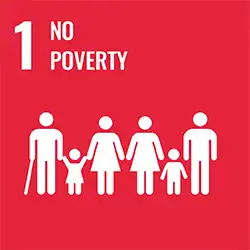GOAL 1 : NO POVERTY
GOAL 1 : NO POVERTY
Education has proven to promote economic growth and be one of the most effective ways to reduce poverty. Illiteracy cost the global economy an estimated US $1.2 trillion in 2015. More than 790 million people are either completely illiterate or functionally illiterate. Without quality and accessible education, people in both rich and poor countries can become trapped in a cycle of poverty with limited opportunities for employment or income generation. This cycle is often perpetuated with children needing to leave school due to the obligation to work and provide support for the family. Research shows that for every US $1 invested in early childhood education, it is estimated to lead to a return as high as US $17 for the most disadvantaged and impoverished children. Many of the poor work as daily laborers or run microenterprises. The more educated they are, the more likely it is that they will start a business and that their businesses will be profitable. In impoverished areas of Uganda, for example, owners of household enterprises who had completed primary education earned 36% more than those with no education, and those who had completed lower secondary education earned 56% more. It is estimated that 171 million people could be lifted out of poverty – a 12% drop in people living on less than US $1.25 a day – if all students in low-income countries attained basic reading skills. One extra year of schooling increases an individual’s earnings by up to 10%, and each additional year of schooling raises average annual gross domestic product by 0.37%.
Valuing Human Dignity
Inequality is only getting worse, and exacting a heavy toll on dignity
The world is getting richer, but wealth is being concentrated in fewer hands. That is, while global inequality has generally declined as millions of people are lifted out of poverty, inequality within countries has continued to rise. The world’s 2,153 billionaires hold more cumulative wealth than 4.6 billion people – a group equal in size to more than half of the global population – according to a report published in early 2020 by Oxfam International. The issue of inequality relative to economic development is receiving renewed public attention, as it has only worsened in many parts of the world since the global financial crisis more than a decade ago. That in turn has helped trigger the rise of populist political movements that exploit fears about job security and immigration. The risks created by persistent inequality threaten to trigger long-term impacts on individual rights – and on personal dignity. This assault on dignity further fuels the appeal of populist rhetoric, aggravates levels of political polarization, and threatens to erode the social fabric in many countries.
In addition to the wealth gap, other forms of inequality have also robbed many people of their dignity. The World Economic Forum has noted that the global gender parity gap in terms of health, education, politics, and the workplace only continues to widen, for example. And reports have detailed systemic racial discrimination creating significant social and financial barriers in countries including the US and the United Kingdom. Developments like this have a very real human cost, not least in the form of psychological and emotional strain. Indeed, young people are increasingly suffering from mental health problems. The recognition of the inherent dignity of every living person must be shared by all societies – and translated into action aimed at reducing economic and social inequality, providing equal access to essential services and goods as well as equal opportunities, and securing human rights and individual freedom. These rights include the right to life and liberty, freedom from slavery and torture, freedom of opinion and expression, and the right to work and receive an education.
Poverty is a persistent impediment to achieving good health worldwide
The World Health Organization has estimated that about 1.2 billion people around the world are living in extreme poverty – a significant cause of poor health outcomes, as people with limited resources face greater exposure to risks and disability due to inadequate sanitation, food, shelter, and medical care. The cost of health care is also a major contributing factor to poverty; according to a 2016 WHO fact sheet, 100 million people were being stricken with poverty due to health care costs every year, and 150 million people were suffering financial catastrophe every year because of out-of-pocket expenditures on health services. In addition, a 2017 report published by the World Bank estimated that roughly 800 million people are spending more than 10% of their household budget on health care, while nearly 200 million people must spend one quarter of their household budget on health care.
The cyclical nature of poverty and sub-optimal health outcomes is evident in both high- and low-income countries. A major contributing factor is the rise of non-communicable diseases (NCDs), such as cancer or diabetes, and related risk factors that can burden individuals, their families, and entire communities; these include impoverishment from long-term treatment and care costs, and a loss of income due to reduced productivity. In 2015, the United Nations adopted Sustainable Development Goals in order to help the global community address complex, interconnected issues related to poverty, global health, human rights, economic growth, environmental sustainability, and equality. The third development goal features targets including the reduction of the burden of NCDs, and achieving universal health coverage by 2030 – including access to quality health services, effective and affordable essential medicines and vaccines, and protection from related financial risk. In a progress report on the Sustainable Development Goals published by the UN in 2017, it noted that it will be necessary to avert an anticipated shortfall of about 18 million health workers by 2030, if it is to remain possible to achieve and sustain universal health coverage by that point; major shortages of such workers are a serious concern in nearly all of the countries in sub-Saharan Africa, according to the report.

